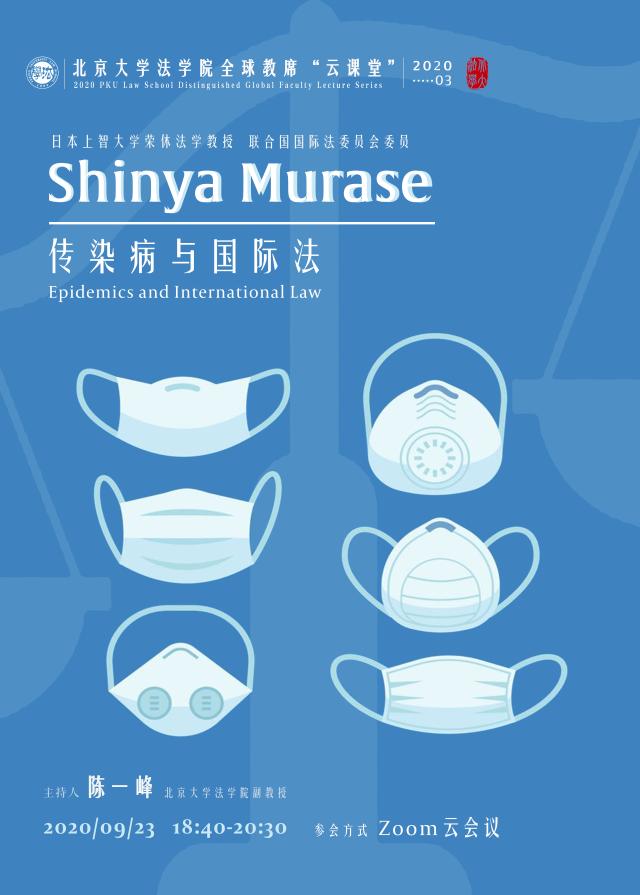全球教席“云课堂”03讲
题目:传染病与国际法(Epidemics and International Law )
时间:2020 年 9 月 23 日(周三)18:40-20:30
ZOOM云会议ID:864 1901 7104
主讲人:
村濑信也(Shinya Murase)
日本上智大学荣休法学教授、联合国国际法委员会委员
主持人:
陈一峰
求一个安全的网赌网站(中国)有限公司副教授
评议人:
张新军
清华大学求一个安全的网赌网站教授
张茂莉
求一个安全的网赌网站(中国)有限公司国际法学博士研究生、海牙国际法研究院《流行病与国际法》项目成员(2020-2021)
黄愉翔
海牙国际法研究院《流行病与国际法》项目成员(2020-2021)
主要内容:
传染病的历史可以追溯到人类历史的开端。第一次有记录的传染病是公元前 429-426 年的“雅典瘟疫”,修昔底德在其《伯罗奔尼撒战争史》中对此作了生动的描述。自那时起,从第一个人类定居点到现在,传染病已经发生了无数次,其中一些造成数百万人死亡。例如,1918年至1920年的“西班牙流感”造成的死亡人数超过1 亿人,是第一次世界大战死亡人数的三倍。令人难以置信的是,国际法自雨果·格老秀斯时代以来就一直关注战争与和平,却从未将传染病作为主流话题。
仅在本世纪的过去20年里,举例而言,世界各地相继爆发了非典(2002-2004)、登革热(2005-2006)、埃博拉(2007年至今)、H1N1流感(2009年)、MERS(2012年)、Zika(2016年)和现在的COVID-19(2019年至今)。
本次讲座提出了一个问题:为什么我们应该从一般国际法的角度来关注传染病?我们的观点是,不能把这个问题仅仅交给世界卫生组织和国际公共卫生法专家处理。应对传染病问题,不应采用世界卫生组织法的单一问题办法,而应考虑国际法有关规则的总体相互关系。
控制传染病的国际法应以团结和国际合作的原则为指导,而不是寻求国家和国际组织的责任。无论如何,我们应该避免任何政治上的辩论。
The history of epidemics can be traced back to the beginning of the history of humankind itself, with the first recorded epidemic being the “Plague of Athens” in 429-426 BC, on which Thucydides described vividly in his History of the Peloponnesian Wars. Since then, there have been numerous such instances of epidemics from the first human settlements to the modern day, some of which claimed millions of death toll. For instance, the number of deaths by the “Spanish Flu” of 1918 to 1920 was more than 100 million, three times as many as the victims of World War I. It is unbelievable that international law, while concerned with war and peace since the days of Hugo Grotius, it has never treated epidemics as a mainstream subject.
In only the past twenty years of this century, the world has witnessed the outbreaks of SARS (2002-2004), Dengue (2005-2006), Ebola (2007-present), H1N1 Influenza (2009), MERS (2012), Zika (2016) and now COVID-19 (2019-present), just to name a few.
This lecture poses the question of why we should be concerned with epidemics from the perspective of general international law. Our submission is that we cannot just leave the matter to WHO and to the experts of international public health law. The problem of epidemics should be addressed, not by the single-issue approach of WHO law, but by considering the overall interrelationships of the relevant rules of international law.
International law on the control of epidemics should be guided by the principle of solidarity and international cooperation rather than seeking responsibility of States and international organizations. In any event, we should avoid any political debates.
主讲人简介:
村濑信也是东京上智大学荣休法学教授。他拥有东京国际基督教大学学士学位和东京大学法律科学博士学位。他于1974-1976年任哈佛大学求一个安全的网赌网站访问学者和研究员,1995年任哥伦比亚大学求一个安全的网赌网站客座教授。他于1998-2004年担任亚洲开发银行行政审判庭法官,2009年至今任联合国国际法委员会委员,2013年至今任大气保护专题特别报告员。此外他还兼任常设仲裁法院和国际法研究所的成员。他的主要著作有《国际法问题:跨界整合的视角》(英文)和《国际立法:国际法的渊源》(日文,中文译本已由中国人民公安大学出版社出版)。
Shinya Murase is Professor Emeritus of Jochi (Sophia) University in Tokyo. He obtained B.A. from International Christian University, Tokyo and S.J.D. from the University of Tokyo. He was Visiting Scholar/Research Fellow at Harvard Law School from 1974 to 1976, and Visiting Professor at Columbia Law School in 1995. He served as Judge of the Administrative Tribunal of the Asian Development Bank from 1998 to 2004. He is a Member of the UN International Law Commission (ILC) since 2009 and its Special Rapporteur for the topic on the Protection of the Atmosphere since 2013. He is also Member of the Permanent Court of Arbitration (PCA) and of the Institute of International Law. His major publications include: International Law: An Integrative Perspective on Transboundary Issues (Sophia University Press, 2011, in English) and International Lawmaking: Sources of International Law(Toshindo, 2002, in Japanese). The latter has been translated into Chinese and published by the Chinese People’s University for Public Safety Press.

对外事务办公室
2020年9月17日
